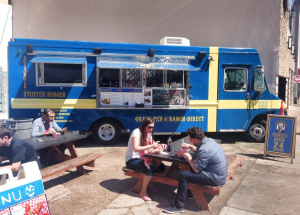No, food trucks cannot legally park anywhere. Each city has its own set of rules and regulations governing where food trucks can park and operate.
In general, food trucks are not allowed to park in residential areas, near schools or hospitals, or outside other restaurants without the appropriate permits. They are also not allowed to park in areas where there is no parking available for the public in places like loading zones.

Find a lit up area for your food truck.
Here are some of the most common food truck parking restrictions:
- Parking permits: Many cities require food trucks to obtain a parking permit before they can park in a public space.
- Permit parking zones: Some cities have designated permit parking zones for food trucks. These zones are typically located in areas with high foot traffic, such as downtown areas or near tourist attractions.
- No parking zones: Some cities have designated no parking zones for food trucks. These zones are typically located in areas where there is a lot of traffic or where there is a risk of food trucks blocking access to businesses or homes.
It is important to check with the local authorities to find out where food trucks are allowed to park. You can usually find this information on the city’s website or by calling the city’s parking enforcement office.
In most cases, you should assume that you are not able to park at a location without permission of the property owner. For example, you may have seen hotdog vendors sitting outside of a Lowe’s or Home Depot before? Before you can legally vend in front of either hardware supply stores, you’ll need to complete an application and pay a fee. Before you vend at any private property or business, reach out to the property owner to identify the approval process.
How to Legally Park a Food Truck
Here are some tips for finding legally park a food truck for vending.
- Identify Special Events: Legitimate special events like weekly food truck rallies, fairs, carnivals or music festivals will all explain the process for attending the event. The registrations will usually be published on the event website.
- Check with the local authorities: As mentioned above, it is important to check with the local authorities to find out where food trucks are allowed to park. Each city
- Look for designated permit parking zones: If your city has designated permit parking zones for food trucks, these are usually the best places to park.
- Avoid no parking zones: If your city has designated no parking zones for food trucks, it is important to avoid these areas.
- Be respectful of other businesses and residents: When parking your food truck, be respectful of other businesses and residents. Do not park in front of driveways or fire hydrants, and avoid parking in areas where you would block access to businesses or homes.
By following these tips, you can help to ensure that you are parking your food truck legally and respectfully.

Protect your investment in a food truck.
Keeping a Food Truck Safe with Overnight Parking
Keeping your food truck safe overnight is essential for an operator. Unfortunately, food trucks can become targets for burglars hoping to steal an expensive piece of cooking equipment or look for cash in a register. Here are some tips for safe overnight food truck parking:
- Park in a well-lit area: This will make it less likely that your food truck will be targeted by opportunistic criminals.
- Add Security Cameras: By setting up security cameras on a food truck, you can help prevent truck break-ins. If you add cameras, a thief will be more concerned about getting recorded, caught, and persecuted.
- Park near other businesses or homes: This will provide some added security, as there will be people around who may notice if anything suspicious is happening. Another option is to park in a secure location like a long-term storage facility. While it will likely add another $200 – $500 monthly expense to store the truck these locations are usually protected by walls, security cameras, and staff.
- Lock your food truck doors and windows: This will make it more difficult for someone to break into your truck and steal your food or equipment. More often than not, burglars are looking for crimes of opportunity that are easy to get in and out of.
- Remove any valuables from your food truck: This includes things like cash, credit card readers, cash registers, and food. Remove as many expensive items as are practical.
- Take pictures of your food truck before you leave it overnight: This will help you to identify it if it is stolen. Make sure to record details like your VIN number and proof of ownership so you can provide that information to authorities if needed.
- Report any suspicious activity to the police: If you see anything suspicious, such as someone lurking around your food truck or someone trying to break into it, report it to the police immediately.
By following these tips, you can help to keep your food truck safe and secure overnight. Considering an investment in a food truck typically ranges from $50,000 – $100,000, it pays to protect your business investment.

Leave A Comment